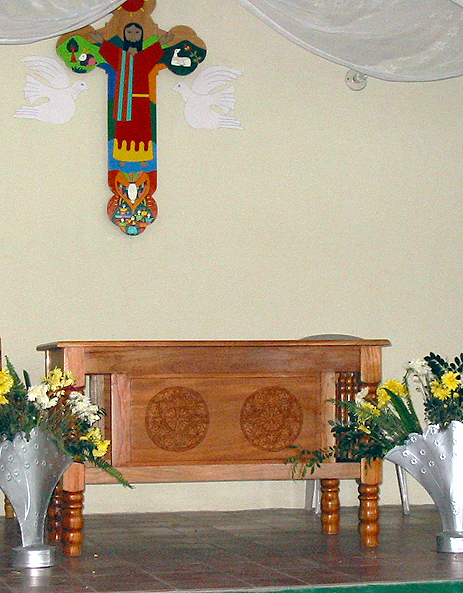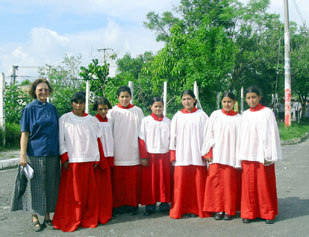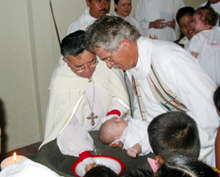15 June 2003

| Volume 3 Number 3 - - - August 2003 | Internet Edition - - - San Salvador, El Salvador |
| Men's Retreat Visual Health Clinic |
Parish and Micro
Business |
Cross-Cultural living Music Classes |
Developments in Theological Evangelists earn diplomas |
| For
Printable PDF download click |
newsletter |
| Santísima
Trinidad Building Consecrated 15 June 2003 |
 |
 A local artisan made the baptismal font and stand for the pascal candle |
 Local furniture makers constructed
the new altar at Santísma Trinidad of cedar and etched the
Celtic design chosen by church members
|
 An artisan working with Fernado
Llort who developed the Salvadoran enamelled wood figures created this
cross with sun, resurrected Christ and dove to represent the Trinity.
|
| People and
friends of Santísima Trinidad celebrated the consecration of the
new
church building,15 June 2003, with traditional procession from entry of
Colonia Santa Teresa housing project to church where Bishop Barahona
blessed the threshhold before people entered. The construction, funded by United Thank Offering of the Episcopal Church USA, is the culmination of much prayer, dreaming and planning, and hard work on the part of parishioners, the project architect and engineer, local workers and diocesan staff. |
 Young people who participated in the
Dedication as acolytes here pose
with "La Reverenda Kay".
|
 Bishop baptizes son of parish
evangelist Flor de María. Ed Schmitt holds our new godson, Eric
Mundo
Hernández, shared with second godmother, Irma Alvarado,
the
diocesan Youth Worker.
|
Evangelists earn diplomasOn Saturday 21 June five members of the Evangelists Team of the Diocese of El Salvador were awarded their diplomas in Basic Biblical Studies. This eight-month course was offered by la Universidad Luterana de El Salvador. This comprehensive course was a survey course in which the students read the entire Bible. Along with the reading the students attended five-hour weekly classes on introductory issues and began their acquisition of necessary skills for responsible Biblical interpretation. This programme is very much a practical course. The evangelists have been using their developing understanding of the Bible in Bible Studies as part of their parish ministry and in their preaching. Those Evangelists who are exploring a call to ordained ministry will continue as students in the provincial theological college (see CAETS) |
| Return to
Home Page Return to top of page |
|
Cross-cultural Moments
|
| Return to
Home Page Return to top of page |
| Return to top of page Return to Home Page |
| Return to top of page
Return to Home Page |
| Return to top of
page |
| Return to Home Page |
| Return to top of page Return to Home Page |
| To send an e-mail message to Kay and Ed Schmitt click accvim@yahoo.ca |
| Last updated 06 08.2003 |